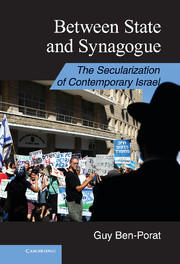Preface and Acknowledgments
Published online by Cambridge University Press: 05 January 2013
Summary
A study of secularization in Israel may seem strange considering the fact that a separation of religion and state is unlikely in the near future, only Orthodox Judaism is recognized by the state, religious parties hold significant political power, and a 2009 survey indicates that more Jewish Israelis described themselves as “religious” or “very religious” than they did 10 years ago and fewer describe themselves as “secular.” Religion in Israel is welded into the essence of nationality that is built into the Jewish definition of the state and is institutionalized through religious institutions that have a direct bearing on individual lives on intimate issues such as marriage and divorce. The prolonged and lingering failure of secular Israelis to change any of the above was a reason why scholars were dismissive of Israeli secularism:
Most of the issues in the struggle for control of the public domain are usually relatively marginal.…Most of the public defined as secular have no interest in these subjects unless the issues affect a specific community directly and generally speaking the tendency is to separate them from the general and comprehensive context, apparently owing to the absence of a consolidated ideology and a secular Jewish organized philosophy ever since the disappearance of etatism. The major reason for the marginality of the struggles over the public sphere…is the inability of the state and the majority of the majority of the Jewish population to engage with the major problem…separating nationhood from religion and the encompassing character of Jewish identity in Israel. (Kimmerling, 2004: 256)
Studies of religion and politics in Israel may have been right to regard secularism as weak but seemed to have missed important developments that suggest secularization may be part of contemporary life. The expansion of commerce on the Sabbath, a thriving nonkosher culinary culture, marriages performed without Orthodox rabbis, civil burials, and even an annual lively gay pride parade, all relatively new developments, allude that the religious hold on public and private life may be changing. What is unique about these developments, and why they remained below the radars of social scientists, is, first, the fact that they are not necessarily related to a secular ideology; second, that they occur alongside a religious resurgence; and, third, that they advance outside of formal political processes.
- Type
- Chapter
- Information
- Between State and SynagogueThe Secularization of Contemporary Israel, pp. xi - xxiiPublisher: Cambridge University PressPrint publication year: 2013
- 1
- Cited by

